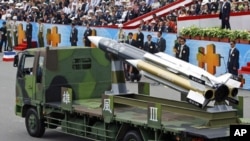This year Taiwan started to deploy supersonic anti-ship missiles in response to China’s growing naval arsenal. Those third generation Hsiung Feng missiles that are now positioned on some 20 ships point to a strengthening in Taiwan’s normally low-key domestic missile production. But its military might is growing at a time when relations with Beijing are better than ever.
Taiwan develops advanced weaponary
Weapons production is all but natural for the island that long ago mastered high-technology for commercial aims as diverse as machine tools and semiconductors. During the past 30 years, Taiwanese military researchers have developed anti-ship, surface-to-air and air-to-air missiles as well as an indigenous defense fighters and more commonplace sea mines and torpedoes. Analysts say the quality is steadily increasing.
In March this year, the military test fired domestic and U.S.-made missiles at the Chiu Peng Test Range in a remote coastal area of southern Taiwan. Despite some misses during the test, it says 70 to 90 percent of its missiles are in good shape, including those made here on the island.
Preparing to fend off attacks
Some 160 kilometers away from the coast is China, Taiwan’s would-be target ever since Chiang Kai-shek’s Nationalists lost the Chinese civil war of the 1940s and fled to Taiwan. China’s Communists still claim sovereignty over self-ruled Taiwan today and have not renounced the threat of force if Taiwan moves toward formal independence.
Beijing spends about $92 billion, 10 times more than Taiwan, per year on its quickly modernizing military and is considered far ahead in terms of fire power. Taiwan officials complain that Beijing is always adding to its arsenal of an estimated 1,900 missiles aimed at the island.
Taiwan military officials will not give a budget for homegrown arms, calling it a state secret. But a defense spokesman said the budget for acquiring U.S.-made F-16 fighter jets would decrease in 2012. Nathan Liu, a military relations scholar at Taiwan’s Mingchuan University, Taiwan's own weapons have the firepower to fend off an attack but the government may not have the budget to mount a strong defense.
Budget challenges
“In terms of technology and capability, I think Taiwan has that kind of capability, but we don’t have enough of a budget. Because of the limit of budget, so we couldn’t produce (a large) enough number of missiles. So if we don’t have enough number of missiles, which means that we can’t launch any meaningful attack, so it really doesn’t make too much sense,” said Liu.
China still warily watches the island’s military production. Earlier this year official Chinese media reported that a Taiwanese multiple rocket launcher was deployed on an outlying island near China but later taken offline. The subject of the third-generation Hsiung Feng missiles, which can travel at twice the speed of sound with a range of 130 kilometers, appeared on a Chinese news forum. Beijing could become more alarmed if Taiwan pursues widely reported plans to build a long-range ballistic missile dubbed the Hsiung Feng-2E with a 400-kilogram warhead.
Strategic, economic relationship with China
Apart from their military maneuvering, Taiwan’s relations with China have improved markedly since 2008. Nationalist Party President Ma Ying-jeou has increased trade dialogue with Beijing, which is eager to reunify with Taiwan through peaceful means.
Raymond Wu, managing partner with the political risk consultancy e-telligence in Taipei, says homegrown weapons are still popular across party lines.
"Despite the tremendous progress in cross-Strait economic relations during the past three years, I think the issue of national security is still very, very important for the majority in Taiwan. So given the fact that there is a lot of support within Taiwan for strong national defense then there's the need for the government, for the military forces to continue to upgrade military preparedness and also the weapons capabilities," stated Wu.
Wu says the arms industry is also seen among the Taiwanese public as a way to secure more power at the bargaining table with China in economic and other issues. But he says the support is also because the island’s historic top arms supplier, the United States, in recent years has been more reluctant to sell heavy weapons.
US weapons in Taiwan
“Given the fact that the trilateral relations between United States, China and Taiwan is a delicate balance, the sale of U.S. weapons to Taiwan has always been ultra-sensitive. Therefore there is the continued need for Taiwan to upgrade our self-defense forces and capabilities,” said Wu.
Although they have sold arms to Taiwan for decades, U.S. officials risk upsetting their uneasy strategic and economic relationship with China with new weapon sales. In January 2010 Beijing fumed and suspended military exchanges after Washington approved a $6.4 billion arms package to Taiwan. Since last year, U.S. diplomats in Taipei have said they would broadly evaluate Taiwan’s defense needs, possibly deciding against new hardware.
A spokesman for the island’s National Ministry of Defense said Taiwan needs its own weapons to ensure timely production. But he stopped short of saying the United States, its main arms supplier, is too slow in processing the island’s requests for U.S.-made weapons. Taipei is still urging Washington to approve the sale of as many as 66 F-16 jets, and members of the U.S. Congress are stepping up pressure on President Barack Obama to approve the order.
